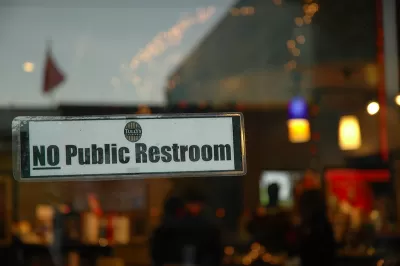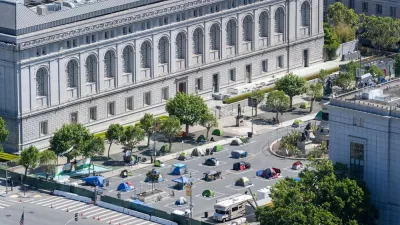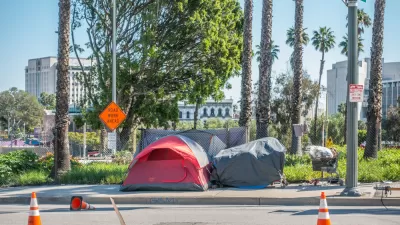For many people with chronic illnesses, access to public restrooms can be a critical medical issue. Incentivizing businesses to open their restrooms can fill a critical gap in U.S. cities.

In a piece for Bloomberg CityLab, Michael Osso and Marilyn G. Geller call for a new solution to the “great urban restroom shortage,” an issue Planetizen has highlighted before.
“Most of us have experienced the challenge of finding a public restroom, but for many, restroom access isn’t just a matter of convenience — it’s a serious medical issue,” the authors, respectively the president and CEO of the Crohn’s & Colitis Foundation and the Celiac Disease Foundation, argue. Since many U.S. cities lack adequate restroom facilities, Osso and Geller suggest that, in lieu of a targeted public investment in more public facilities, private businesses should open their restroom doors to the public, and governments should incentivize them to do so through direct payments or tax credits.
We expect the generosity of participating businesses to be fully paid back in the form of increased goodwill — and revenue, above and beyond any incentives. In fact, a recent Crohn’s & Colitis Foundation survey found that more than three-quarters of inflammatory bowel disease (IBD) patients stated that they were more likely to patronize a business if they could find their restrooms on a restroom finder app.
The authors point out that similar incentives to encourage businesses to comply with Americans with Disabilities Act (ADA) guidelines already exist, and restroom incentive programs are popular in Germany and the United Kingdom. Making more restrooms publicly available, they write, can benefit businesses and make cities easier to navigate for more people.
FULL STORY: How to Solve the Great Urban Restroom Shortage

Alabama: Trump Terminates Settlements for Black Communities Harmed By Raw Sewage
Trump deemed the landmark civil rights agreement “illegal DEI and environmental justice policy.”

Planetizen Federal Action Tracker
A weekly monitor of how Trump’s orders and actions are impacting planners and planning in America.

The 120 Year Old Tiny Home Villages That Sheltered San Francisco’s Earthquake Refugees
More than a century ago, San Francisco mobilized to house thousands of residents displaced by the 1906 earthquake. Could their strategy offer a model for the present?

Ken Jennings Launches Transit Web Series
The Jeopardy champ wants you to ride public transit.

BLM To Rescind Public Lands Rule
The change will downgrade conservation, once again putting federal land at risk for mining and other extractive uses.

Indy Neighborhood Group Builds Temporary Multi-Use Path
Community members, aided in part by funding from the city, repurposed a vehicle lane to create a protected bike and pedestrian path for the summer season.
Urban Design for Planners 1: Software Tools
This six-course series explores essential urban design concepts using open source software and equips planners with the tools they need to participate fully in the urban design process.
Planning for Universal Design
Learn the tools for implementing Universal Design in planning regulations.
Clanton & Associates, Inc.
Jessamine County Fiscal Court
Institute for Housing and Urban Development Studies (IHS)
City of Grandview
Harvard GSD Executive Education
Toledo-Lucas County Plan Commissions
Salt Lake City
NYU Wagner Graduate School of Public Service





























